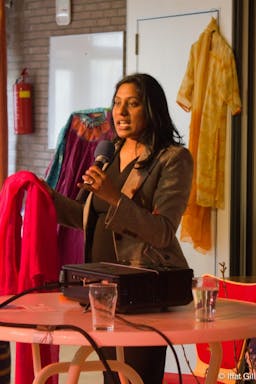Taking the gender-digital-inclusion debate forward
May 28, 2019
Story

Two weeks ago, in the first week of May 2016, the World Summit on the Information Society (WSIS for short) was held in Geneva, Switzerland. The event was attended by 1,800 participants from 140 countries, including 85 ministers and 250 high-level representatives. I had the honour of being a High Level Speaker to share input about 'inclusion and gender equality' at a High Level policy session on Inclusion. This meant that we had moved from a small workshop as a side event to the main meeting, we were now center stage in the main event, giving a voice to women in the global debate to bring the Internet to everyone and bridge the digital divide.
In May 2014, I was asked to share stories from World Pulse’s Women Weave the Web campaign on digital inclusion at WSIS. The stories were personal and represented the voices of grass-root level community leaders from around the globe.
I am proud to say that the efforts paid off and our contributions to the WSIS process were noted in the forum's outcome document. The document was adopted by the UN General Assembly last December.
Since then, ChunriChoupaal, the organisation I found for empowering women through technology, kept raising the issue of gender equality and digital inclusion of women at the WSIS forum, both in 2015 and now in 2016. I organised thematic workshops on the issues and possible solutions that were stopping women from joining the digital revolution. It has been an exciting journey. For instance, we got the attention of policy makers at the European Parliament and we contributed to the report “Empowering Women in the Digital Age.” This report by Terry Reintke has just been voted in by the European Parliament and it has solid recommendations for countries to enable women and girls to join the digital economy through education, skill building and investment in women.
This year, my team at ChunriChoupaal - The Code To Change championed the message of inclusion of women and girls in the digital economy through bridging the skills gap throughout the WSIS Forum. In my interventions, I highlighted how important it is to address the digital skills gap to ensure economic empowerment of women. Access alone is not enough, we need to work on aligning the digital skills to local needs and interests of the communities. We need to empower and invest in grass-root community leaders who are already working in their communities to accelerate the steps to achieve the United Nations’ Sustainable Development Goals-SDGs especially SDG 5 for gender equality.
I also raised the question of how organisations are performing to recruit, retain and promote more women, because if we want to change the world, we need to start with our own homes, our own organisations. The other challenges included attitude of men towards inclusion of women and how implicit and explicit bias is hurting women to succeed in the workplace and become part of the digital economy. Lack of safe spaces, both online and offline is another issue which results from biased attitudes in many cultures of the world.
One story I would like to share with the community: During the event, we organised a workshop on Gender Equality and e-Skills Gap. I mentioned this to a WSIS delegate, a gentleman. He could not stop laughing, repeating ‘gender equality.’ I personally failed to see the humour in it but this does bring me back to the point of attitude of men and stereotypes that are prevalent in cultures throughout the globe.
I highlighted the need for more practical solutions to address the digital skills gap. My organisation started ‘The Code to Change’ program; a collaboration between non-profit groups, IT industry, technologists community and academics. The Code to Change is designed to teach digital skills to women in order to succeed in the job market. Programs like The Code to Change which targets existing talent that doesn’t have the digital know-how, can really help address the skills gap.
In addition to my duties as speaker, I was selected to be a High Level Policy track facilitator to facilitate the policy session on 'financing for Development and the role of ICTs.' The policy panels included high level government officials and ministers from United States, Switzerland, Nepal, Senegal, Serbia, Turkey, Nigeria, Portugal, Namibia, Tunisia, Argentina and European leaders from academia and the technical community, including ICANN and the IEEE (Institute of Electrical and Electronics Engineers).
I am proud to be part of a vibrant community and World Pulse platform which enables grass-root and community leaders to make a contribution to the global gender-equality debate and play a small part in the struggle for social and economic inclusion in the digital economy.
Give us a shoutout if you plan to be there next year! Let us amplify our voices to create action- oreinted change together!
My favourite quote from theHigh Level Policy Session on Access to Information and Knowledge for All:
“Women need to be part of creating the technology and not just remain consumers. We need to empower grassroots level community leaders to facilitate inclusion of girls and women from under-represented communities.” Iffat Gill
For more details about our work, please visitChunriChoupaal-The Code ToChangewebsite.




